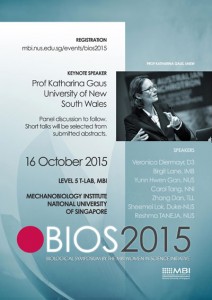Post-event Report: BIOS 2015
Biological Symposium by the MBI Women in Science Initiative
Post Event Report by Lakshmi Ramachandran | october 2015
On Friday, October 16, 2015, the Mechanobiology Institute (MBI), Singapore, hosted the inaugural Biological Symposium (BIOS) series, BIOS2015. This free symposium, which is an initiative by the Women In Science (WIS) committee at the MBI, brought together close to one hundred scientists from various research institutes in Singapore, including the MBI, National University of Singapore (NUS), NUS Yong Loo Lin School of Medicine, Nanyang Technological University (NTU), Institute of Medical Biology (IMB), Institute of Molecular and Cell Biology (IMCB), Temasek Life Sciences Laboratory (TLL), National Neuroscience Institute (NNI), Duke-NUS, and D3-A*STAR.
The talks covered a variety of topics including cell signaling, cytoskeleton, infectious diseases, cancer and drug discovery in Singapore, highlighting the diversity and talent of researchers working in the biological sciences in Singapore. A unique feature of BIOS2015 was that all of the speakers were women, and talks were given both by established researchers as well as post-doctoral fellows and graduate students.
On October 16, 2015, the Mechanobiology Institute (MBI), Singapore, hosted the inaugural Biological Symposium (BIOS) series, BIOS2015. This free symposium, an initiative by the Women In Science (WIS) committee at the MBI, brought together close to one hundred scientists from various research institutes in Singapore.
BIOS2015 opened with a welcome address by Prof. Linda Kenney, principal investigator at MBI and professor of microbiology at the University of Illinois-Chicago, who is also one of the key drivers of the WIS initiative at the MBI.
The three sessions in BIOS2015 were titled “Microorganisms”, “Cell signaling in disease” and “Cytoskeleton, disease and drugs”. A recurring theme in all sessions was Mechanobiology. The various talks on mechanobiology portrayed the relevance of mechanobiology in disease and highlighted some advances in mechanobiology research. Prof. Birgit Lane, executive director at IMB-A*STAR and a pioneer in keratin research, gave a very informative talk on keratin, the key cytoskeletal protein in epithelial cells that make up our skin as well as the lining of internal organs. Besides being essential for keeping our skin intact, it also plays a role in mechanical signaling in response to mechanical stress. Prof. Lane spoke about how studying the rare fragile skin disease epidermolysis bullosa simplex has provided remarkable insight into keratin function.
A role for cytoskeletal proteins in infection was highlighted in a talk by IMCB research fellow Dr. Lee Wei Lin, who showed how the pathogen Yersinia exploits actin to phosphorylate proteins that regulate actin polymerization. Dr. Khoo Bee Luan from the MBI discussed how innovation and advances in technologies used in mechanobiology have paved way for novel diagnostics in cancer. She showed how microfabrication can be used to capture and expand circulating breast cancer cells, and how this can be used clinically to predict response to anti-cancer therapy.
Other mechanobiology talks included a talk by Dr. Zhang Dan from TLL on how the endoplasmic reticulum regulates actomyosin ring assembly in fission yeast. MBI graduate students Hu Xian and Charlotte Guetta presented their findings using interesting images and videos showing real-time recruitment of proteins at focal adhesions, and novel modes of cell migration along nanofibers respectively.
I. Microorganisms
The first session on “Microorganisms” chaired by MBI graduate student Mrinal Shah commenced with a very interesting talk by Prof. Yunn Hwen Gan from Yong Loo Lin School of Medicine, NUS. Prof. Yunn has pioneered the study of an endemic disease called melioidosis caused by the bacterium Burkholderia pseudomallei. She presented her seminal findings on the bacteria’s virulence mechanisms and host immune responses. Although, Prof. Yunn was faced with challenges when Burkholderia pseudomallei was classified as a bioterrorism agent, which has limited the scope of her research, she has persevered on studying this bacteria with the aim of developing novel therapeutics.
The next talk by Prof. Shee Mei Lok from Duke-NUS addressed the current problem of dengue fever, both in Singapore and worldwide. She highlighted the need for developing safe and effective therapies for dengue as currently there are no licensed dengue virus vaccines. Prof. Shee Mei presented promising research findings from her lab in creating novel dengue virus vaccines and therapeutics using neutralizing epitopes.
Prof. Mary B Chan-Park from NTU then spoke about her innovative work designing antimicrobial polysaccaharides, mainly the development of non-toxic, biocompatible, cationic, nanoporous hydrogels that can selectively kill microbes by specifically disrupting their anionic membranes. One advantage of the chitosan-based hydrogel is that it can be topically applied, making it well-suited to preventing or treating catheter-associated and stent-associated infections.
II. Cell Signaling in Disease
Following a coffee break, BIOS2015 continued with the second session on “Cell Signaling in Disease”, chaired by MBI research fellow Dr. Pascale Monzo. This session featured talks focused on the molecular characterization of different cancers, predictive biomarkers, and precision medicine for better treatment of diseases and improving patient lives. Dr. Carol Tang from NNI highlighted the need for stratified medicines to treat brain tumors and presented supporting work with a JAK/STAT inhibitor AZD1480. Prof. Reshma Taneja from NUS revealed how epigenetic changes like preferential histone acetylation of oncogenic fusion protein PAX3-FKHR over a critical protein involved in muscle development (MyoD) can drive the development of a type of muscle tumor, rhabdomyosarcoma. NUS graduate student Priyanka Balaganapathy discussed the role of notch signaling in p53–mediated neuronal cell death in cerebral ischemia, suggesting the possibility that therapies targeting the notch pathway could delay neuronal cell death in patients suffering from stroke.
III. Cytoskeleton, Disease and Drugs
The lunch break after the morning sessions provided unique networking opportunities and time for informal scientific discussion. The afternoon session on “Cytoskeleton, disease and drugs” chaired by MBI research fellow Dr. Rishita Changde, featured some of the talks on mechanobiology described in detail in the beginning of this article. This session concluded with an enlightening talk by Dr. Veronica Diermayr, head of project management D3 (A*STAR), on what happens downstream of the drug discovery pipeline as well as on Singapore’s spectacular progress so far in anti-cancer drug development.
Keynote Address
The keynote address by Prof. Katharina Gaus (NHMRC Senior Research Fellow at the University of New South Wales and Head of the EMBL Australia Node in Single Molecule Science) saw a packed seminar hall and intrigued audience. Prof. Gaus’s research is focused on understanding how T cells make the decision to initiate an immune response. She has pioneered the development of new super-resolution microscopes to understand complex interactions within T-cell signaling networks based on analyses of single molecules.
Panel Discussion
Following the scientific talks, there was an engaging panel discussion on junior careers in academia and alternate careers in science, with a special focus on women in science. The panelists, Prof. Katharina Gaus (UNSW), Prof. Birgit Lane (IMB), Dr. Sheemei Lok (Duke-NUS), Dr. Mary B Chan-Park (NTU), Dr. Zhang Dan (TLL), Dr. Veronica Diermyer (D3-A*STAR), and Jolene Tan (AWARE), addressed a range of questions from the audience, from “what it takes to make it in science” to “possible solutions to enable women to make it to top positions in science”.
One of the major points brought out in the discussion is the importance of introspection and determining one’s personal goals, and then pursuing that goal with passion and hard work, be it in academia or in alternate science careers. Also, the panel encouraged doctoral students to look at alternate science careers, as there are plenty of opportunities for science graduates outside of academia. In particular, there is a requirement for people with a sound knowledge of science to interface between funding bodies and scientists, and similar people are also required in technology transfer and legal offices. . In conclusion, the panel stated that choosing the right mentors, building a good social and personal trust network, maintaining self-confidence, and having the right attitude for job interviews are paramount to achieving your goals.
The panel discussion also brought up the striking drop in number of women at top positions in science. At the graduate student or post-doctoral level, there are almost as many females as males. However the numbers of females drop drastically at the senior research fellow, principal investigator and director levels. This is a trend seen everywhere and Singapore is no exception. The panel attempted to identify the reasons for this and come up possible solutions.
From the discussions it became clear that personal choices, family and kids are not the only reason for the drop in numbers of women from top science positions. In fact, the panel discussion shed light on an often over-looked and under-estimated reason: an unconscious bias towards recruiting men! Ms. Jolene Tan from the Association of Women for Action and Research (AWARE), Singapore, presented figures supporting this unconscious bias. The number of female and male applicants for a position starts at the same figure but gets skewed and biased towards male applicants from the time of application screening, interviews to the final selection of candidates. Therefore there is an urgent need for awareness as much as for action and solutions to ensure that the scientific knowledge and skills that talented women scientists gain through years of doctoral and postdoctoral training do not go wasted either because of a gender bias or lack of institutional support or consideration for women who strive hard to balance work and family.
The MBI and WIS committee would like to thank L’Oréal and Thermo Fisher scientific for sponsoring BIOS2015, and we look forward to BIOS2016 next year.
MBI-WIS Organizing Committee Members: Linda Kenney, Dee Dupuy, Pascale Monzo, Rishita Changede, Mallika Nagarajan, Naila Alieva, Stuti Desai, Ekta Makhija, Mrinal Shah, Megan Louise Finch-Edmondson, Minnah Thomas, Lakshmi Ramachandran
Program
16 October, 2015
Level 5, T-Lab, Mechanobiology Institute, National University of Singapore
| 9:00am | Welcome address: Linda Kenney |
Session I: MicroorganismsSession Chair: Mrinal Shah |
|
| 9:00am to 9:30am |
Yunn Hwen Gan Unraveling the mystery of an endemic bacterial pathogen which also happens to be a bioterrorism agent |
| 9:30am to 10:00am | Sheemei Lok CryoEM structure shows antibody neutralize dengue virusserotype 2 by locking E protein dimers |
| 10:00am to 10:30am | Mary B Chan-Park Selective antimicrobial polysaccharides for diverse applications |
| 10:30am to 10:45am | Hu Xian How does the stretch cycles of talin in mature adhesions recruit vinculin- a time resolved single molecule analysis |
| 10:45am to 11:00am | Coffee Break |
Session II: Cell Signaling in DiseaseSession chair: Pascale Monzo |
|
| 11:00am to 11:30am | Reshma Taneja Unravelling epigenetic changes in skeletal myopathies |
| 11:30am to 12:00am | Carol Tang Targeting brain tumors: improving lives through precision medicine |
| 12:00am to 12:30pm | Zhang Dan The cortical ER regulates actomyosin ring assembly through ER-PM contacts |
| 12:30pm to 12:45pm | Bee Luan Short-term expansion of breast circulating cancer cells predicts response to Anti-cancer therapy |
| 12:45pm to 1:00pm | Priyanka Balaganapathy The role of Notch in p53 mediated neuronal cell death in cerebral ischemia |
| 1:00pm to 2:00pm | Lunch |
Session III: Cytoskeleton, Disease and DrugsSession chair: Rishita Changede |
|
| 2:00pm to 2:30pm |
Birgit Lane Understanding keratin function through studying rare diseases |
| 2:30pm to 3:00pm |
Veronica Diermayr Moving forward- Singapore’s successes in oncology drug development |
| 3:00pm to 3:15pm |
Lee Wei Lin Yersinia effector YopO uses actin as bait to phosphorylate proteins that regulate actin polymerization |
| 3:15pm to 3:30pm |
Charlotte Guetta Protrusive waves guide 3D cell migration along nanofibers |
| 3:30pm to 4:00pm |
Coffee Break |
Keynote |
|
| 4:00pm to 5:00pm |
Katharina Gaus Molecular insights into the regulation of T cell signalling |
| 5:00pm to 6:00pm |
Panel discussion Panelists: Katharina Gaus, Mary B Chan-Park, Veronica Diermayr, Reshma Taneja, Zhang Dan, Jolene Tan (AWARE) |
| 6:00pm | Concluding remarks: Stuti Desai |
| To follow: Happy hour at Lvl 10, MBI, T-Lab | |




